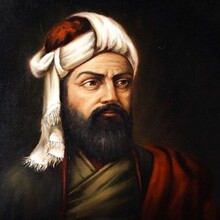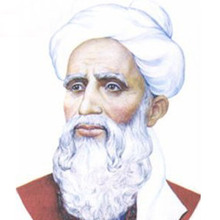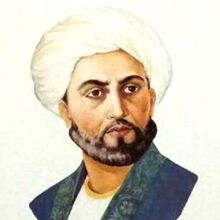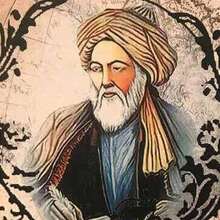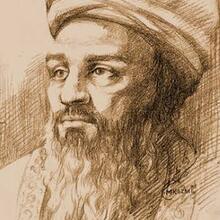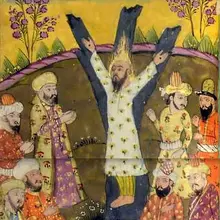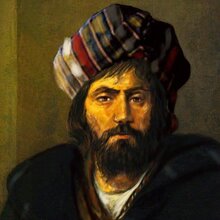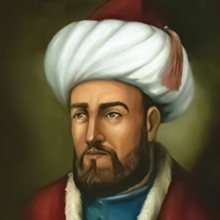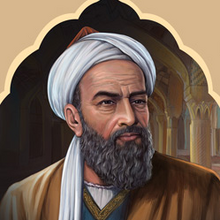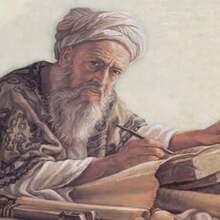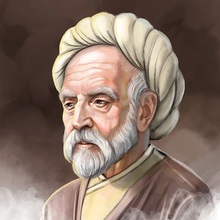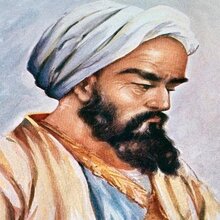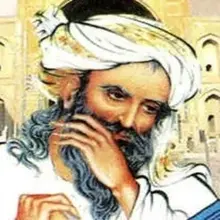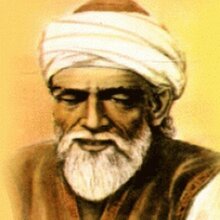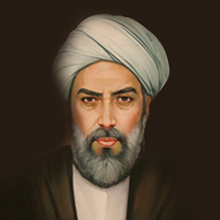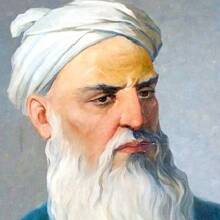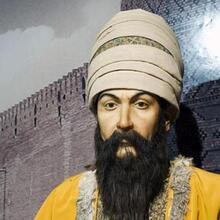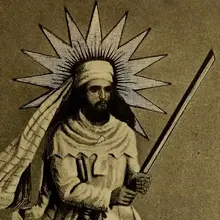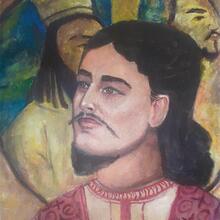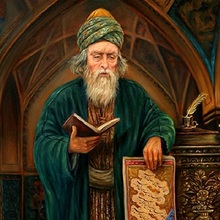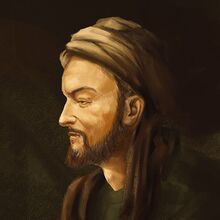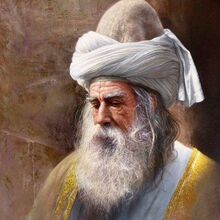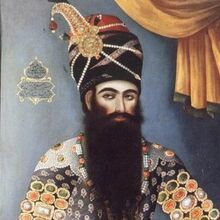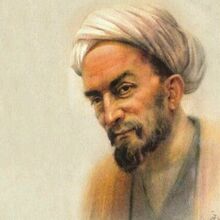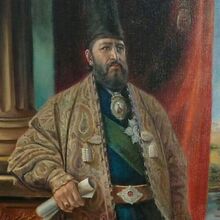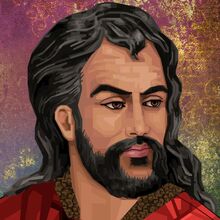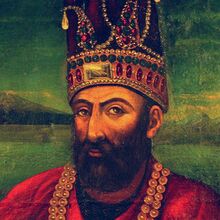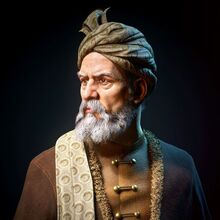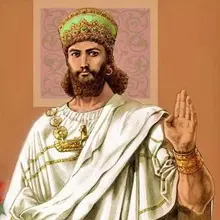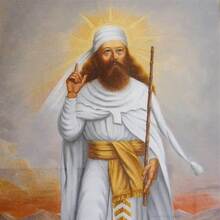 Abu Hamid Muhammad al-Ghazali
1058 - 1111
Theologian, jurist, philosopher, Sufi master
Abu Hamid Muhammad al-Ghazali
1058 - 1111
Theologian, jurist, philosopher, Sufi master
 Baha al-Din Muhammad al-Amili
1547 - 1621
Scholar, poet, philosopher, architect
Baha al-Din Muhammad al-Amili
1547 - 1621
Scholar, poet, philosopher, architect
 Shahab ud Din Mar ashi Najafi
1897 - 1990
Shia jurist and marja'
Shahab ud Din Mar ashi Najafi
1897 - 1990
Shia jurist and marja'
 Psamtik III
-567 - -525
Last pharaoh of the 26th dynasty of Egypt
Psamtik III
-567 - -525
Last pharaoh of the 26th dynasty of Egypt
 Abu al-Mughith al-Husayn ibn Mansur al-Hallaj
858 - 922
Mystic, poet, teacher of Sufism
Abu al-Mughith al-Husayn ibn Mansur al-Hallaj
858 - 922
Mystic, poet, teacher of Sufism
 Abu Rayhan Muhammad ibn Ahmad al-Biruni
973 - 1048
Scholar, polymath, astronomer, mathematician
Abu Rayhan Muhammad ibn Ahmad al-Biruni
973 - 1048
Scholar, polymath, astronomer, mathematician
 Ala al-Dawla Mirza
1417 - 1460
Timurid Prince
Ala al-Dawla Mirza
1417 - 1460
Timurid Prince
 Abdullah Ansari
1006 - 1088
Poet, mystic, scholar, commentator of the Quran
Abdullah Ansari
1006 - 1088
Poet, mystic, scholar, commentator of the Quran
 Saadi Shirazi
1210 - 1291
Persian poet and prose writer
Saadi Shirazi
1210 - 1291
Persian poet and prose writer
 Fariduddin Attar
1145 - 1221
Sufi poet and mystic
Fariduddin Attar
1145 - 1221
Sufi poet and mystic
 Abu Rayhan Muhammad ibn Ahmad al-Biruni
973 - 1048
Scholar, polymath, astronomer, mathematician
Abu Rayhan Muhammad ibn Ahmad al-Biruni
973 - 1048
Scholar, polymath, astronomer, mathematician
 Zoroaster
-1000 - -551
Prophet and founder of Zoroastrianism
Zoroaster
-1000 - -551
Prophet and founder of Zoroastrianism
 Mazdak
216 - 274
Founder of Mazdakism, a religion of late antiquity
Mazdak
216 - 274
Founder of Mazdakism, a religion of late antiquity
 Nader Shah Afshar
1688 - 1747
Founder of the Afsharid dynasty and ruler of Iran
Nader Shah Afshar
1688 - 1747
Founder of the Afsharid dynasty and ruler of Iran
 Parthamasiris
50 - 114
King of Armenia
Parthamasiris
50 - 114
King of Armenia
 Fath-Ali Shah Qajar
1769 - 1834
King of Iran
Fath-Ali Shah Qajar
1769 - 1834
King of Iran
 Qutb al-Din al-Shirazi
1236 - 1311
Astronomy, mathematics, medicine, music theory
Qutb al-Din al-Shirazi
1236 - 1311
Astronomy, mathematics, medicine, music theory
 Ebn Sina
980 - 1037
Peripatetic philosophy, medicine, Islamic theology
Ebn Sina
980 - 1037
Peripatetic philosophy, medicine, Islamic theology
 Nizami Ganjavi
1141 - 1209
Poet, mystic, traveler, philosopher
Nizami Ganjavi
1141 - 1209
Poet, mystic, traveler, philosopher
 Abu al-Wafa al-Buzjani
940 - 998
Innovator in spherical trigonometry
Abu al-Wafa al-Buzjani
940 - 998
Innovator in spherical trigonometry
 Naser Khosrow
1004 - 1088
Poet, mystic, traveler, philosopher
Naser Khosrow
1004 - 1088
Poet, mystic, traveler, philosopher
 Ubayd Zakani
1319 - 1369
Poet and satirist of the Mongol era
Ubayd Zakani
1319 - 1369
Poet and satirist of the Mongol era
 Abdul Aziz al Hakim
1953 - 2009
Leader of Islamic Supreme Council of Iraq
Abdul Aziz al Hakim
1953 - 2009
Leader of Islamic Supreme Council of Iraq
 Amir Kabir - Mirza Taghi Khan Farahani
1807 - 1852
Prime Minister of Iran and modernizer
Amir Kabir - Mirza Taghi Khan Farahani
1807 - 1852
Prime Minister of Iran and modernizer
 Muhammad Anvari
1126 - 1189
Poet, philosopher, alchemist, polymath
Muhammad Anvari
1126 - 1189
Poet, philosopher, alchemist, polymath
 Hafez
1325 - 1390
One of the greatest Persian poets and mystics
Hafez
1325 - 1390
One of the greatest Persian poets and mystics
 Mulla Sadra
1571 - 1640
Founder of Transcendent Theosophy
Mulla Sadra
1571 - 1640
Founder of Transcendent Theosophy
 Azad Khan Afghan
1722 - 1781
Military Commander
Azad Khan Afghan
1722 - 1781
Military Commander
 Jabir ibn Hayyan
721 - 815
Alchemist and philosopher
Jabir ibn Hayyan
721 - 815
Alchemist and philosopher
 Omar Khayyam
1048 - 1131
Peripatetic philosophy, astronomy, alchemy, poetry
Omar Khayyam
1048 - 1131
Peripatetic philosophy, astronomy, alchemy, poetry
 Molana Jalal Uddin Rumi
1207 - 1273
Sufi poetry, Hanafi, Maturidi theology
Molana Jalal Uddin Rumi
1207 - 1273
Sufi poetry, Hanafi, Maturidi theology
 Hakim Abolghasem Ferdowsi
940 - 1020
Epic poet and composer of Shahnameh
Hakim Abolghasem Ferdowsi
940 - 1020
Epic poet and composer of Shahnameh
 Rudaki
858 - 940
The first major poet to write in New Persian
Rudaki
858 - 940
The first major poet to write in New Persian
 Naser al-Din Shah Qajar
1831 - 1896
Shah of Iran
Naser al-Din Shah Qajar
1831 - 1896
Shah of Iran
 Mani
216 - 274
Founder of Manichaeism
Mani
216 - 274
Founder of Manichaeism
 Muhammad ibn Zakariya al-Razi
865 - 925
Alchemist, discoverer of alcohol and sulfuric acid
Muhammad ibn Zakariya al-Razi
865 - 925
Alchemist, discoverer of alcohol and sulfuric acid
 Cyrus the Great
-600 - -530
founder of the Achaemenid Empire, the first P
Cyrus the Great
-600 - -530
founder of the Achaemenid Empire, the first P
 Abu Nasr Muhammad al-Farabi
870 - 950
Philosopher, logician, musician, cosmologist
Abu Nasr Muhammad al-Farabi
870 - 950
Philosopher, logician, musician, cosmologist
We Need -- admin in



